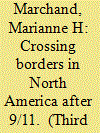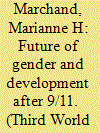|
|
|
Sort Order |
|
|
|
Items / Page
|
|
|
|
|
|
|
| Srl | Item |
| 1 |
ID:
152792


|
|
|
|
|
| Summary/Abstract |
This article is part of a larger project on ordinary border crossings and state practices in North America. The changing border governmentalities in the region focusing on securitising their borders against potential terrorist threats and the increased emphasis on the managing of population flows have led to a reduced mobility for certain travellers as opposed to others. The construction of potentially safe and ‘un-safe’ subjects through profiling on the basis of race, ethnicity, national origin, gender, religion and socioeconomic background and the increasing use of biometrics have impacted upon travellers’ mobilities. In the North American context, the Mexican state has undergone significant modernisation in terms of its border control capacities, thus enhancing not only its capacity as a buffer state, but also its performative sovereignty, and is therefore an interesting case to study. This article aims to analyse how these transformations in border governmentalities have affected the mobility of ‘ordinary’ travellers, and how they have developed coping strategies and resistances towards the potential curbing of their respective mobilities.
|
|
|
|
|
|
|
|
|
|
|
|
|
|
|
|
| 2 |
ID:
089231


|
|
|
|
|
| Publication |
2009.
|
| Summary/Abstract |
The area of gender and development has been a site of critical contributions to the field of development studies and has been characterised as bridging practice, policy and theory. Since the policy of gender mainstreaming has been accepted, however, much of the originality and issues raised by the gender and development field have been marginalised and excluded from the development (policy) agenda. Some even argue that gender has been written out of the post- 9/11 development agenda thanks to the new global security regime. This article goes beyond these debates and suggests new ways of thinking about gender and development. Instead of arguing that it is 'dead', I argue that it is the site of innovative and critical thinking about development issues in a transformed and globalised world. The starting point for my argument is the insights provided by postcolonial feminism and transnationalism. While the former has contributed to feminist theorising through such concepts as representation, 'othering' and the silencing of Third World women's voices, the latter helps us understand new global realities resulting from migrations and the creation of transnational communities.
|
|
|
|
|
|
|
|
|
|
|
|
|
|
|
|
| 3 |
ID:
164831


|
|
|
|
|
| Summary/Abstract |
This article is part of a larger project that focuses in part on the migration dynamics in large Mexican metropolitan areas or globalising cities. In particular, it develops a comparative analysis of the urbanised region of Puebla-Tlaxcala, the metropolis of Monterrey and Tijuana. All three metropolitan areas are important industrial centres that attract rural–urban as well as interstate migrations. Moreover, these urban centres are situated at routes used by migrants from Central and South America to get to the US. Yet, despite the increasing impact of migration(s) on urban areas, very little is known about its characteristics and municipal authorities have not identified inward or transmigration as issues of political importance. For our analysis we intend to map the different migrations through addressing the following question: How are migrations transforming the urban areas of Monterrey, Tijuana and Puebla-Tlaxcala and how are they inserted in and contributing to urban assemblages in these metropolitan zones? For this particular article we have chosen three distinct migratory groups to contrast: Germans in Puebla-Tlaxcala, Haitians in Tijuana and Indigenous populations in Monterrey.
|
|
|
|
|
|
|
|
|
|
|
|
|
|
|
|
| 4 |
ID:
085995


|
|
|
|
|
| Publication |
2008.
|
| Summary/Abstract |
This article sets out to challenge the dominant perspective on the nexus between migration and security. In particular since the terrorist attacks on 11 September 2001 the discourse on migrants has been increasingly 'securitised'. Migrants are seen as potential terrorists and thus constitute a security risk for the state. Taking the vantage point of migrants the present article introduces another nexus: the migration-insecurities nexus. It argues that migration as a social process is embedded in violence and insecurities. To start, the mal- or underdevelopment in sending regions has caused many people to migrate-in other words, migration is in part a consequence of the 'violence of development'. However, the insecurities related to the migratory process do not end with the initial moment of departure-they extend to the entire migratory experience, ranging from crossing borders to being subjected to abuse and discrimination at the workplace and the risk of being deported. Additionally, family members and communities of origin are not exempt from being exposed to multiple insecurities. In sum, the article presents a different take on migration as a potential security risk, using Mexican migration to the USA as example.
|
|
|
|
|
|
|
|
|
|
|
|
|
|
|
|
|
|
|
|
|